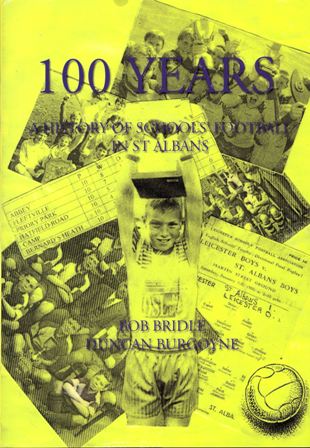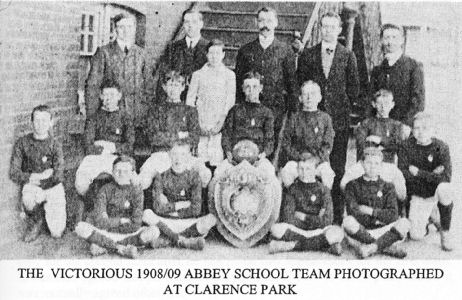 100
Years
100
Years
A History of Schools Football in St Albans
by Bob Bridle & Duncan Burgoyne
St Albans Primary Schools Sports Association, 2004
Local histories on special topic can be exciting because they can turn up facts you never expected to find out about your ancestors. I was interested to see the section "The Early Years" and while it did not mention my father (he was of school football playing age during the First World War) the account of matches from the Herts Advertiser help paint a view of one aspect of school life at the time.
The book looks at what was happening year by year, in ten year periods, with each decade starting weith key football events during the decade, including changes if football rules, etc. It ends with information on the local leagues and cups, with lists of winners. There are many pictures of football teams.
From the point of view of the family historian the only problem is the lack of an index, although the year by year treatment means that if you know when they went to school in St Albans it should not take to long to sdee if their school is mentioned at the time your relative was there.

|
Extract from: The Early Days of School Football Under the 1870 Education Act, Games were not included in the subjects that schools should teach. Drill was taught, often by ex-soldiers drilling large numbers of children. This became physical exercises (P.E.). It was not until the early years of the 20th century that games such as cricket and football were taught in elementary schools. Schools throughout the country were playing inter-school football in the last few years of the 19th century. By the beginning of the 20th century most schools were "all-age" and boys left school at fourteen. This is why the Senior Wix Competition is for under fifteens. There was little organised football for under elevens, until about 1930. School football existed before the St. Albans Schools' Football Association was formed. During the 1894/95 season St. Albans Grammar School (Verulam) played eleven matches, winning seven, losing three and drawing one. Opponents were such teams such as Watford Excelsior, Watford Endowed, Royal Masonic and St. Albans Reserves. They scored 47 goals and conceded 17. Oxford House School played quite a few matches. In March 1900, they played Dagmar House from Hatfield and won 3-1. Apparently the game was exciting and "The combination shown by the Oxford House's team was conspicuous ". The captain, A. Smith "kicked" two of the goals and F. Thorpe the other. A week later they played Frogmore Juniors and even though their opponents were a "very large set of players" they won 3-1 (Oxford House was a boarding school in Bricket Road for boys and girls.) |
| Locating
Books Secondhand copy seen advertised online at £115 !!! |
Page created February 2009


